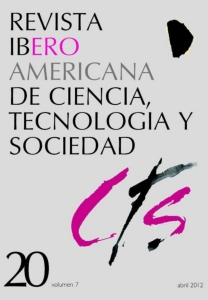Public understanding of biotechnology
The case of GM food in postgraduate courses
DOI:
https://doi.org/10.52712/issn.1850-0013-690Keywords:
STS education, socio-technological controversies, STS postgraduate courses, GM foodAbstract
This work deals with socio-technological controversies within the context of STS postgraduate education. The case describes the results of a didactic intervention on GM food in Cuba that was given as part of the Master of Social Studies in Science and Technology of the University of Cienfuegos. The time needed to develop the active methodologies in one-week courses is a key aspect in this study, given that the goal of the intervention was to give the participants a socio-technological grounding in this material. Using previous experiences, the goal is to improve the educational methodology based on debates and discussions in small groups and minor research carried out at a distance. This article describes the results obtained and identifies the STS subject matter that emerges during discussions and debates. The results indicate that the methodology applied and the focus on contextualized controversies about GM food improve the results of teaching prior experiences, while also serving as a useful introduction to STS subjects such as the precautionary principle, the evaluation of technologies, social control of technologies, the knowledge dialogue and risk perception.
Downloads
References
ACEVEDO, J. A., VAZQUEZ, A., MANASSERO, M. A. y ACEVEDO, P. (2007): “Consensos sobre la naturaleza de la Ciencia: Fundamentos de una investigación empírica”, Revista Eureka sobre Enseñanza y Divulgación de las Ciencias,vol. 4, nº 1, pp. 42-66.
ACEVEDO, J. A. (2008): “El estado actual de la naturaleza de la ciencia en la didáctica de las ciencias”, Revista Eureka sobre Enseñanza y Divulgación de las Ciencias,vol. 5, nº 2, pp. 178-198.
AIBAR, E. (2002): “El conocimiento científico en las controversias públicas”, en E. Aibar y M. A. Quintanilla: Cultura tecnológica. Estudios de Ciencia, Tecnología y Sociedad, Barcelona,ICE/Horsori, pp. 105-125.
ECHEVERRÍA, J. (1995): Filosofía de la Ciencia. Barcelona, Editorial Akal.
FERNÁNDEZ, I., GIL, D., CARRASCOSA, J., CACHAPUZ, A. y PRAIA, J. (2002): “Visiones deformadas de la ciencia transmitidas por la enseñanza”. Enseñanza de las Ciencias,vol. 20, nº 3, pp. 477-488.
GONZÁLEZ, M., LÓPEZ-CEREZO, J. A. y LUJÁN, L. (1996): Ciencia, tecnología y sociedad. Una introducción al estudio social de la ciencia y la tecnología,Madrid, Editorial Tecnos.
LEDERMAN, N. G. (1992): “Students’ and teachers’ conceptions of the nature of science: a review of the research”, Journal of Research in Science Teaching,vol. 29, nº 4, pp. 331-359.
MANASSERO, M. A., VÁZQUEZ, A. y ACEVEDO, J. A. (2001): Avaluació dels temes de ciència, tecnologia i societat,Palma de Mallorca, Conselleria d’Educació i Cultura del Govern de les Illes Ballears.
MARTÍN-GORDILLO, M. y OSORIO C. (2003): “Educar para participar en ciencia y tecnología. Un proyecto para la difusión de la cultura científica”, Revista Iberoamericana de Educación, nº 32, pp. 165-210. Disponible en: http://www.campusoei.org/revista/rie32a08.pdf.
MEMBIELA, P. (2002): Enseñanza de las ciencias desde la perspectiva ciencia- tecnología-sociedad. Formación científica para la ciudadanía,Madrid, Narcea.
MORALES, M. (2009): “Los estudios sobre imágenes de la ciencia y la tecnología”, en M. Morales (ed.): CTS, cuestiones de interpretación teórica,Cienfuegos, Editorial Universo Sur, pp. 93-100.
MORALES, M., GÓMEZ, V. y MOYA, N. (2011): “Panorama del estado de los estudios CTS en Cuba”, en C. Espinoza, (comp.): Ciencia, tecnología y sociedad en la universidad de hoy,Quito, UMET/UCF, pp. 55-63.
NÚÑEZ, J. (1999): La ciencia y la tecnología como procesos sociales. Lo que la educación científica no debería olvidar,La Habana, Editorial Félix Varela.
ROSENTHAL, D. B. (1989): “Two approaches to science-technology-society (S-T-S) education”, Science Education,vol. 73, nº 5, pp. 581-589.
VALLVERDÚ, J. (2005): “¿Cómo finalizan las controversias? Un nuevo modelo de análisis: la controvertida historia de la sacarina”, Revista Iberoamericana de Ciencia, Tecnología y Sociedad -CTS,vol. 2, nº 5, pp. 19-50.
Downloads
Published
How to Cite
Issue
Section
License
Copyright (c) 2024 CC Attribution 4.0

This work is licensed under a Creative Commons Attribution 4.0 International License.
All CTS's issues and academic articles are under a CC-BY license.
Since 2007, CTS has provided open and free access to all its contents, including the complete archive of its quarterly edition and the different products presented in its electronic platform. This decision is based on the belief that offering free access to published materials helps to build a greater and better exchange of knowledge.
In turn, for the quarterly edition, CTS allows institutional and thematic repositories, as well as personal web pages, to self-archive articles in their post-print or editorial version, immediately after the publication of the final version of each issue and under the condition that a link to the original source will be incorporated into the self-archive.











